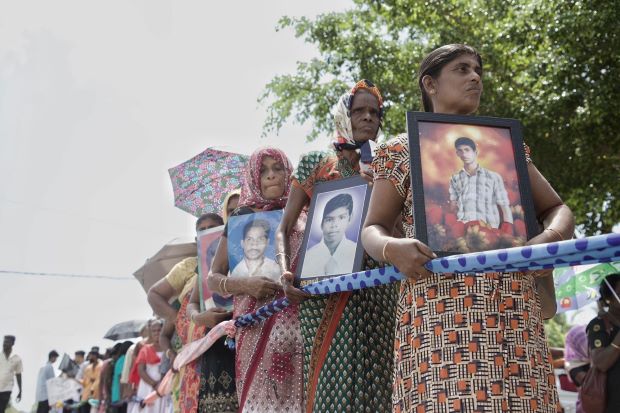India castigates Sri Lanka on failure to find solution to Tamil issue
NEW DELHI – In unusually strong language, India on Monday (12), chastised the Sri Lankan government for a “lack of measurable progress” in finding a political solution to the “ethnic issue” involving Sri Lankan Tamils at a debate in the United Nations Human Rights Council (UNHRC).
India’s statement was made during the discussion on the report released earlier by the Office of the High Commissioner for Human Rights (OHCHR), on the first day of Geneva-based UNHRC’s 51st session.
Initiating the dialogue, the UN acting high commissioner for human rights Nada Al-Nashif stated that Sri Lankan should improve human rights and strengthen institutions to tackle the humanitarian challenges that have sprung from its worst financial crisis in seven decades.
She also urged Sri Lanka’s new government led by President Ranil Wickremesinghe to end the use of security laws to arrest protest leaders who helped oust former president Gotabaya Rajapaksa in July.
Sri Lankan foreign minister Ali Sabry told the same meeting the government was committed to working with the Office of the High Commissioner for Human Rights (OHCHR) on improving human rights but would object to any international judicial intervention it sees as anti-constitutional.
Reading out India’s position, Indian permanent representative to the UN in Geneva, Indra Mani Pandey, criticized Colombo for tardiness in reaching a political solution.
“India has always believed in the responsibility of States for promotion and protection of human rights and constructive international dialogue and cooperation guided by the principles of the UN Charter. In this regard, the Indian delegation notes with concern the lack of measurable progress by the Government of Sri Lanka on their commitments of a political solution to the ethnic issue – through full implementation of the 13th Amendment of the Constitution, delegation of powers to Provincial Councils and holding of Provincial Council elections at the earliest,” said Pandey.
He reiterated that India had always supported a political settlement “within the framework of a united Sri Lanka, ensuring justice, peace, equality and dignity for the Tamils of Sri Lanka”.
Stating that it was in Sri Lanka’s best interests to ensure devolution of power, India called for the early conduct of elections to the Provincial Councils. “We, therefore, urge Sri Lanka to take immediate and credible action in this regard,” he said.
This has been India’s most severe criticism of the Sri Lankan government to date, in recent years. It comes after Colombo allowed a Chinese research vessel to dock at Hambantota port last month, despite New Delhi conveying its security concerns over its intentions.
India had already signalled its unhappiness with Sri Lanka when it issued an advisory calling on Indian tourists to exercise caution and examine all factors before undertaking non-essential travel to India. The advisory led to a drop in the arrival of Indian tourists to Sri Lanka in the last week of August.
This year, India has extended around $4 billion in aid to Sri Lanka as soft loans and currency swaps to tide over the economic crisis. However, the Sri Lankan government has to also enter into talks with China to restructure its debt, an essential requirement before IMF disburses a $2.9 billion loan to Colombo.
In Geneva, Pandey also said the “current crisis in Sri Lanka has demonstrated the limitations of the debt-driven economy and the impact it has on the standard of living”.
Meanwhile, China said other nations should not take advantage of Sri Lanka’s current vulnerability and expressed appreciation for Sri Lanka’s “unremitting efforts in promoting reconciliation”.
“China opposes any country taking advantage of the situation in Sri Lanka to seek self-interest, and urges relevant parties to respect the human rights development path that Sri Lanka has independently chosen according to its national conditions, and abandon the practice of using human rights issues to exert political pressure and interfere in Sri Lanka’s internal affairs,” said the Chinese envoy, Chen Xu.
Later in the UNHRC session, the Western countries could table a draft resolution that may seek an external investigative mechanism to probe human rights abuses in Sri Lanka.
At the UNHRC session in Geneva on Monday, the European Union, which will sponsor the resolution, condemned the “unwarranted use of force against peaceful demonstrators and calls upon Sri Lanka to suspend the Prevention of Terrorism Act until it is in full compliance with international human rights law and standards and calls for accountability and immediate acts to end impunity”.
Sri Lanka had already expressed opposition to any “human rights commission investigation mechanism as it is against our Constitution”, foreign minister Sabry told reporters.
In 2015, Sri Lanka co-sponsored a resolution, which called upon the country to establish a credible judicial process with the participation of Commonwealth and other foreign judges, defence lawyers, and authorised prosecutors and investigators. Incidentally, Wickremesinghe had been the prime minister when Colombo supported the resolution. However, the resolution was never implemented, as the Sri Lankan government had second thoughts about the proposals, especially the provision for foreign judges.
In March 2021, the UN human rights body rejected the domestic mechanism proposed by the then Gotabaya Rajapaksa government. The 2021 resolution was adopted with 22 votes and 11 siding with Sri Lanka, including China. There were 14 abstentions, including India.
India had abstained at voting for the UNHRC resolution, despite stating publicly that the UN human rights chief’s assessment of post-civil war Sri Lanka raised “important concerns”.
– thewire.in/PTI



Comments are closed, but trackbacks and pingbacks are open.